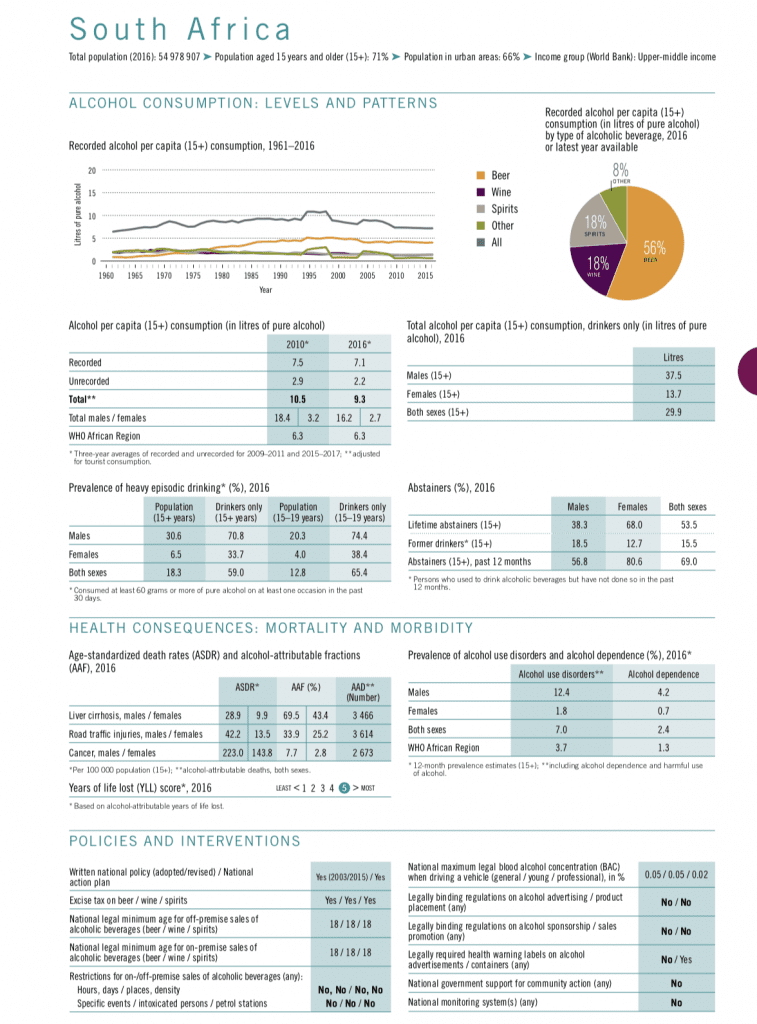SAB Miller, a subsidiary of beer giant AB InBev, the largest beer maker in the world, has challenged the South African government in courts in a desperate attempt to overthrow the life saving alcohol sales ban currently in place in South Africa.
As Movendi International reported, South Africa previously enforced two temporary alcohol sales bans successfully. The first sales ban was instituted from March 27 to June 1, 2020 and the second was instituted from July 13 to August 17, 2020. Both alcohol sales bans led to significant reductions in alcohol-related hospitalizations, crime and accidents which substantially reduced the pressure on the healthcare system and emergency services during the pandemic.
The third and most recent alcohol sales ban came into effect on December 28, 2020 and is set to lift in February 2021. As expected, since the newest sales ban trauma cases linked to alcohol fell by 47% on weekends and by 58% on weekdays in Western Cape, for example.
When announcing the alcohol sales ban President Ramaphosa highlighted that it was meant to reduce hospital admissions and free up hospital beds that are necessary to save more lives during the ongoing pandemic. In late December, 2020 South African hospitals were reportedly out of ICU beds and the alcohol sales ban worked in freeing up beds and alleviating the pressure on the healthcare system.
Big Alcohol claims vs. reality
The alcohol industry is arguing that the alcohol sales bans had caused job loss, increased illegal alcohol sales, and reduced taxes for South Africa.
Job loss is not an exclusive effect faced by the alcohol industry during the pandemic. The response to illegal alcohol sales is strengthening law enforcement, not relaxing alcohol policy measures. The revenue from the alcohol trade to South Africa is dwarfed by the health, social and economic costs of alcohol.
According to a study published in The South African Medical Journal, the health, social and economic costs associated with alcohol are estimated to be between Rand million 245,933 to 280,687 in South Africa, which is approximately between USD 1.6 billion to 1.8 billion. Considering many intangible costs are uncertain the figure is likely underestimated.

The World Health Organization’s (WHO) Global Alcohol Status Report documents over 9000 annual deaths in South Africa directly attributable to alcohol. The country is placed at the highest end for years of life lost due to alcohol.
This heavy alcohol burden is placed on South Africa despite many South Africans living alcohol-free.
The industry is also stressing on “responsible consumption” initiatives despite making the most of their profits off of heavy alcohol users.
A recent report by Vital Strategies exposed how Big Alcohol uses development cooperation to incentivize the alcohol industry, increasing industry profits and market reach, despite the death and disability burden caused by alcohol. The African region is specifically targeted by the alcohol industry due to the growing middle class and youth population as well as flawed or totally absent alcohol policy regulations.
Alcohol industry interference, including by AB InBev, in global public health policy making is well documented by Movendi International.
This move by AB InBev subsidiary SAB Miller against the South African government is an aggressive push against public health policy in South Africa during a public health crisis. Even when lives are at stake, the alcohol industry’s only priority is profit maximization.
In response to this desperate lawsuit, civil society network Southern African Alcohol Policy Alliance South Africa (SAAPA SA) has launched a petition to push SAB to withdraw the court challenge. SAAPA SA argues that the lawsuit was a distraction and will result in diverting government resources away from dealing with the virus effectively.
[This article was updated on January 28, 2021 as per new information from Amandla Awethu]